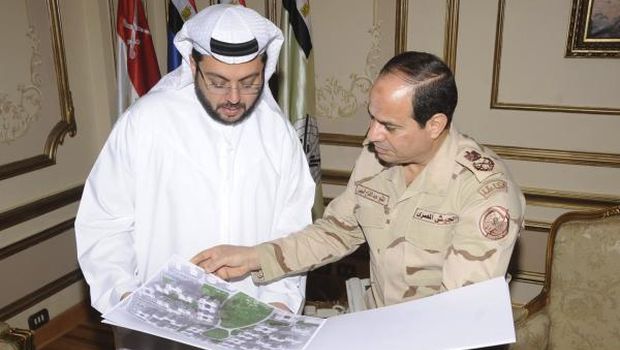
Egypt’s army chief Field Marshal Abdel-Fattah El-Sisi, right, looks at drawings of houses with Hassan Ismaik, Arabtec’s chief executive, at the Ministry of Defense in Cairo in this March 9, 2014 handout provided by Egypt’s Ministry of Defense. (Reuters/Ministry of Defence/Handout via Reuters)
Cairo, Asharq Al-Awsat—Two likely Egyptian presidential candidates have said they are considering withdrawing from the race following the approval on Saturday by Interim President Adly Mansour of the country’s election law, which includes a controversial clause protecting the decisions of the body supervising the upcoming polls from any appeals.
Representatives of Hamdeen Sabahy and Khaled Ali have said both candidates are protesting Article 7 in the new law which protects the decisions of the Higher Presidential Elections Commission (HPEC) from appeals “because the decisions of the administrative committee [HPEC] can be appealed against before the judiciary.”
Wahid Abdel-Maguid, a member of Sabahy’s campaign team, told Asharq Al-Awsat: “We [the Sabahy campaign] are looking into the question of the immunization of HPEC’s decisions on the elections process.”
He added: “There is an ongoing discussion within the campaign and with our partners, and we are looking into the issue in light of the guarantees which could be given to the elections process as a whole, and the decision to continue or boycott is too early to be made, but is being considered.”
A source at HPEC denied its decisions were protected against appeals and said: “Anyone who is affected by the committee’s decisions can appeal before the committee itself according to the regulations, which will not cause delays and disruption to the elections process.”
A military source, meanwhile, told Asharq Al-Awsat that Field Marshal Abdel-Fattah El-Sisi’s resignation from his post as Defense Minister would be preceded by a meeting of the Supreme Council of the Armed Forces (SCAF) to finalize the “special preparations within the military institution.”
The source added that the date of Sisi’s resignation was too early to discuss, but was “undoubtedly linked to the election date which will be announced by HPEC in the coming days.”
The source also said that Sisi’s resignation as defense minister would be preceded by a number of procedures including a SCAF meeting and “coordination with the government and the president to appoint a new defense minister.”
Sisi currently holds the posts of head of the army, deputy prime minister, and minister of defense.
He is widely expected to run for the presidency amid popular calls for him to do so, but must resign his military post before commencing a campaign, as stipulated by Egyptian law, which bars members of the military from becoming president.
On Sunday, Sisi launched a new 40 billion US dollar housing initiative, “For Egypt’s Youth,” aiming to build one million residential units for people with limited income. The project will be developed by UAE-based construction company Arabtec, with some of the funding coming from the UAE.
Col. Ahmed Mohamed Ali, spokesman for the Armed Forces, said on his Facebook account that Sisi met with the chairman of Arabtec in order “to solve the housing problem for youth with limited income, starting with an agreement to build one million housing units in the next five years.”
Colonel Ali added that Arabtec’s chief executive, Hassan Abdallah Ismaik, discussed during the meeting with Sisi the steps taken to launch the project and the results reached after a series of prior meetings between the company and the Egyptian Armed Forces to identify potential construction sites and the available legal and financing mechanisms, as well as a timetable for the implementation of the project.
Ismaik said: “This historic project is the result of the instructions of Sheikh Mohamed Bin Zayed Al Nahyan, Crown Prince of Abu Dhabi, and is based on uniting the efforts of the state to support the current Egyptian leadership to help Egypt.”
He added: “We at Arabtec are proud to cooperate with the Egyptian Armed Forces to carry out the largest housing project in the Arab world, not only in terms of cost, but also in terms of its effect on economic development by providing housing for millions of Egyptians with limited income, and providing employment opportunities for more than one million Egyptians.”
The UAE, which along with Saudi Arabia and Kuwait is opposed to the Muslim Brotherhood, has come out in support of Egypt’s military and its interim government since the ouster of former president Mohamed Mursi last July.
The UAE alone has provided some 7 billion dollars in financial aid to Egypt since Mursi, a high-ranking member of the now-outlawed Muslim Brotherhood, was removed from office by the army following widespread protests against his rule.
